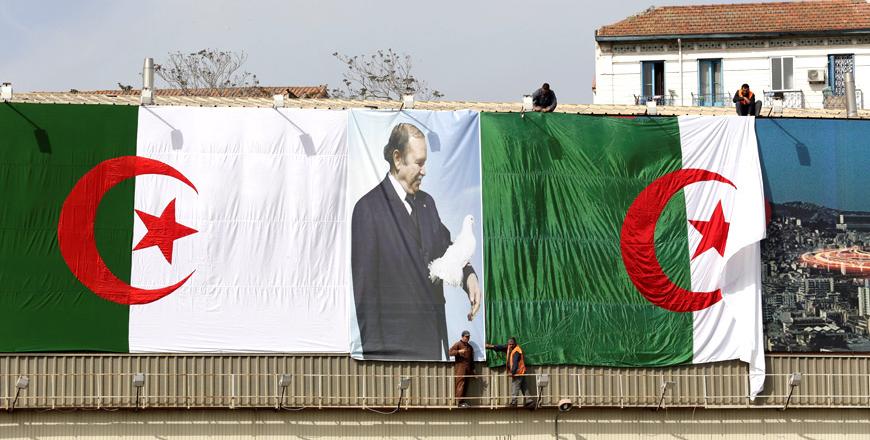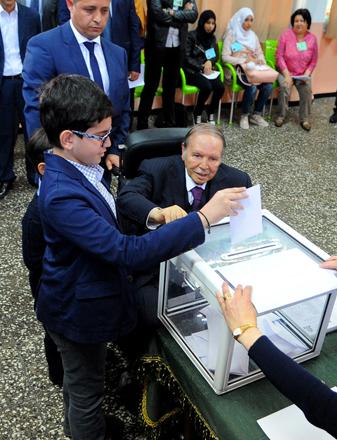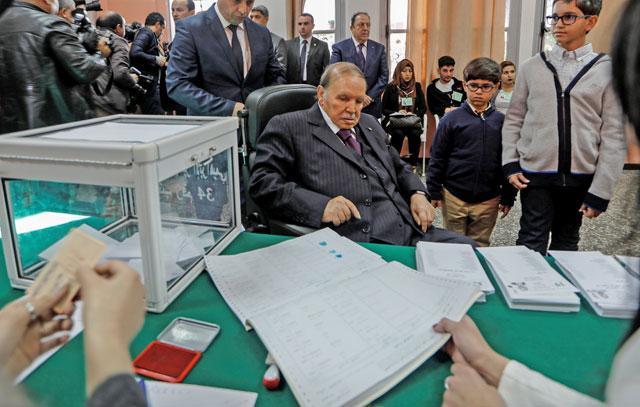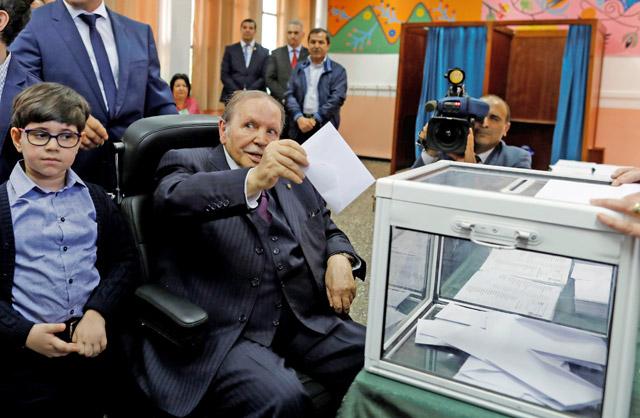You are here
Algerians to elect new parliament amid apathy, president's absence
By Reuters - May 01,2017 - Last updated at May 01,2017

Algerian city employees install Algerian flags and President's Abdelaziz Bouteflika poster on the streets ahead of the parliamentary election in Algiers, Algeria, on Wednesday (Reuters photo)
ALGIERS — In a sports arena festooned with national flags, Algeria's ruling FLN Party pumped up supporters at one final weekend rally before Thursday's parliamentary election with Liberation-era songs and screenings of old speeches by its veteran leader, President Abdelaziz Bouteflika.
Bouteflika, 80, has rarely been seen in public since a stroke in 2013, but the message was clear enough: A vote for FLN is a vote for the stability his supporters say he has delivered to Algeria since it emerged from a 1990s civil war.
"FLN is the party of Bouteflika, and with him we have security," said public sector worker Said, one of the participants in the rally at the Coupole sports arena.
FLN, which has dominated Algeria since it won independence from France in 1962, and the pro-government National Rally for Democracy (RND) are widely expected to win the election against a weak, divided opposition that includes leftists and Islamists.
But the challenge facing the FLN and RND is apathy among voters who see the National Assembly as a rubber-stamp legislature unwilling and unable to offer any real change.
In the last election in 2012, FLN won 221 seats and the RND 70 seats in the 462-seat People's National Assembly by playing the stability card following the Arab Spring revolts in Tunisia, Egypt and Libya. But turnout was just 43 per cent.
"I won't vote, I am sure not to vote. I know that none of them will come up with a change or anything new," said Sofian, 30, a student in Algiers. "They make a lot of promises, but they are there to make laws not to give out gifts."
Uncertainty
With some 70 per cent of Algerians under the age of 30, Bouteflika — in power since 1999 — is the only leader many have known, but he is rarely seen now in public.
In February he cancelled a visit by German Chancellor Angela Merkel, reviving speculation about his health and a possible transfer of power before the next presidential election due in 2019. No clear successor has emerged.
The parliamentary election comes as Algeria, an OPEC member and major gas supplier to Europe, attempts sensitive reforms of its vast social welfare system, price increases for subsidised fuel and spending cuts following a steep decline in global oil prices that have slashed its export earnings.
There are no reliable opinion polls in Algeria, but the FLN and its allies, which have benefited from their association with high state spending, are still hoping to consolidate their parliamentary majority.
Low turnout will likely help the FLN again. Its traditional supporters — the elderly, the military, civil servants — are more likely to vote, and the FLN local party network is also strong in rural areas.
Under Algeria's new constitution, lawmakers will have a say in appointing the prime minister, but their powers remain limited in a country still haunted by memories of the 1990s war with armed Islamist militants.
Government officials have been busy trying to drum up enthusiasm among voters, urging imams to promote the election and again linking the vote to security by pointing to potential threats from militants or unstable neighbours such as Libya.
"There is no other way to let yourself be heard about your rights and your country except to vote," said pro-government MPA Party candidate Djamila Khiar, canvassing on Algiers' main boulevard that is flanked by white colonial-era buildings.
Some opposition parties have decided to boycott Thursday's election, while Islamist parties have united in alliances.
In a working class district of Algiers, RND candidate Seddik Chiheb acknowledged concerns over inflation and falling oil prices and the need for reform as he courted voters at a cafe.
On the street outside pensioners greeted him, but the customers at the cafe were mostly unmoved.
"What does it matter if he visits?" said one customer Musa. "I haven't voted for about 12 years. It won't change anything."
Related Articles
ALGIERS — Algerian voters looked set to hand the ruling FLN and its allies another five-year mandate in a parliamentary election on Thursday
ALGIERS — Algerians trickled to the polls Thursday to vote in local elections after a low-key campaign that has brought no expectation of ch
ALGIERS — Algeria's main Islamist coalition, which came third in this week's legislative elections, on Saturday accused the ruling coalition














